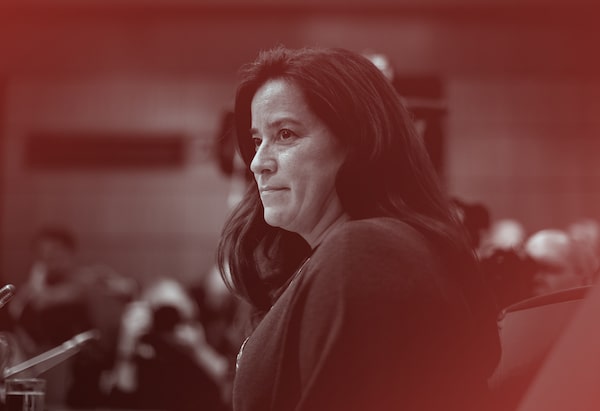This is the weekly Amplify newsletter. If you’re reading this on the web or someone forwarded this e-mail newsletter to you, you can sign up for Amplify and all Globe newsletters here.

Liberal MP and former Canadian justice minister Jody Wilson-Raybould waits to testify before the House of Commons justice committee on Parliament Hill on Feb. 27, 2019.CHRIS WATTIE/The Globe and Mail
Jody Wilson-Raybould’s Kwakwaka’wakw name is Puglaas, which means “woman born to noble people.” Given to her by her grandmother, the name carries notions of dignity, duty and integrity.
I’m Shelby Blackley, the editor of Amplify and a live news editor at The Globe and Mail, and I’m sure I’m not the only one to say that Ms. Wilson-Raybould’s integrity was on full display this week. Like many Canadians, I watched as she spoke before the House of Commons justice committee in the SNC-Lavalin affair. I was tuned in for my job (running The Globe’s live web coverage of the testimony), but beyond that, I took in every word Ms. Wilson-Raybould spoke as a woman watching another woman not back down.
Her testimony, that she had been inappropriately pressed by Prime Minister Justin Trudeau and various members of his office to intervene as attorney-general in the prosecution of the Quebec engineering company, was powerful, insightful and gut wrenching. And it was incredibly brave.
Courage is clearly innate for Ms. Wilson-Raybould, but maybe it was bolstered by the support of women near and far. After Ms. Wilson-Raybould resigned from the federal cabinet on Feb. 12, the hashtag #StandwithJody began trending. Fellow MPs such as Jane Philpott, and Celina Caesar-Chavannes, among others, voiced their support. “When women speak up and out, they are always labelled. Go ahead. Label away. We are not going anywhere,” tweeted Ms. Caesar-Chavannes in solidarity.
Of course, as Ms. Caesar-Chavannes alluded, it’s not all sunshine and rainbows, and Ms. Wilson-Raybould, like many women who have challenged authority before her, has faced some backlash. These words from a piece by a group of academics for the CBC particularly resonate: “Certain Liberal pundits … have been indulging in character assassination, running a whisper campaign that Wilson-Raybould is not a team player, is ‘difficult’ … This feels familiar to many women across the country, now rolling their eyes, recognizing this for the stereotypical cheap shots against women who beg to differ.” (And yes, this woman, too, rolled her eyes.)
But I think you’d have been hard pressed to find a single eye roll as Ms. Wilson-Raybould’s riveting testimony played out before the country. She never raised her voice or appeared heated (need I say more than the name Brett Kavanaugh?). Globe columnist Elizabeth Renzetti describes Ms. Wilson-Raybould’s words as “devastating testimony delivered not with bluster or raised voice, but instead with bland words such as ‘inappropriate’ used like a shiv.”
If you were to ask Ms. Wilson-Raybould how she was able to stay so calm, how she was able to hold it together so stoically, I suspect she may say it’s because she has her truth on her side. “I come from a long line of matriarchs and I am a truth teller in accordance with the laws and traditions of our Big House – this is who I am and who I will always be,” she concluded her testimony.
People have already suggested that Ms. Wilson-Raybould should some day be our prime minister. It’s an idea that goes back to 1983, when her father, First Nations hereditary chief and politician Bill Wilson, made a speech at a constitutional conference on Indigenous issues in front of Pierre Trudeau. “I have two children in Vancouver Island, both of whom for some misguided reason say they want to be a lawyer. Both of whom want to be the prime minister. Both of whom, prime minister, are women,” he said, as the room erupted in laughter.
The idea may have gotten a few laughs then, but if you ask me, as one of countless women in marvel of Ms. Wilson-Raybould, it’s incredibly inspiring today.
What else we’re reading:
I turned 26 on Friday, and as is normal around birthdays, I’ve been spending a lot of time thinking about how far I’ve come, especially in my career. I, along with many of my girlfriends, constantly talk about our ultimate career goals. We all want more and eagerly await – and go after – the next step. This piece from The New York Times helped me think about job advancement in a different way. It may sound counterintuitive, writes Anna Goldfarb, but “carefully examining the particulars of a promotion is essential, as the offer might not be as attractive on closer inspection.” Lori B. Rassaas, a human resources consultant, employment attorney and author of The Perpetual Paycheck, offered this insightful advice: “It’s a better mindset to say, ‘I’m going to get up and I’m going to go to work and I’m going to do the best I can in my current role, develop my own skills and those are mine and no one can impact that.'"
Inspired by something in this newsletter? If so, we hope you’ll amplify it by passing it on. And if there’s something we should know, or feedback you’d like to share, send us an e-mail at amplify@globeandmail.com.